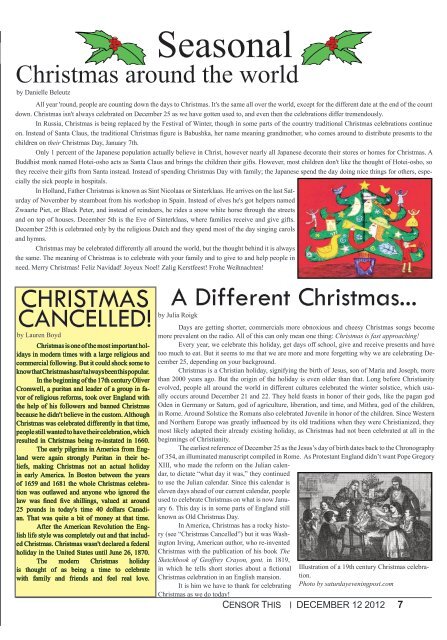CENSOR THIS! - Kelowna Secondary School
CENSOR THIS! - Kelowna Secondary School
CENSOR THIS! - Kelowna Secondary School
You also want an ePaper? Increase the reach of your titles
YUMPU automatically turns print PDFs into web optimized ePapers that Google loves.
Seasonal<br />
Christmas around the world<br />
by Danielle Beleutz<br />
All year 'round, people are counting down the days to Christmas. It's the same all over the world, except for the different date at the end of the count<br />
down. Christmas isn't always celebrated on December 25 as we have gotten used to, and even then the celebrations differ tremendously.<br />
In Russia, Christmas is being replaced by the Festival of Winter, though in some parts of the country traditional Christmas celebrations continue<br />
on. Instead of Santa Claus, the traditional Christmas figure is Babushka, her name meaning grandmother, who comes around to distribute presents to the<br />
children on their Christmas Day, January 7th.<br />
Only 1 percent of the Japanese population actually believe in Christ, however nearly all Japanese decorate their stores or homes for Christmas. A<br />
Buddhist monk named Hotei-osho acts as Santa Claus and brings the children their gifts. However, most children don't like the thought of Hotei-osho, so<br />
they receive their gifts from Santa instead. Instead of spending Christmas Day with family; the Japanese spend the day doing nice things for others, especially<br />
the sick people in hospitals.<br />
In Holland, Father Christmas is known as Sint Nicolaas or Sinterklaas. He arrives on the last Saturday<br />
of November by steamboat from his workshop in Spain. Instead of elves he's got helpers named<br />
Zwaarte Piet, or Black Peter, and instead of reindeers, he rides a snow white horse through the streets<br />
and on top of houses. December 5th is the Eve of Sinterklaas, where families receive and give gifts.<br />
December 25th is celebrated only by the religious Dutch and they spend most of the day singing carols<br />
and hymns.<br />
Christmas may be celebrated differently all around the world, but the thought behind it is always<br />
the same. The meaning of Christmas is to celebrate with your family and to give to and help people in<br />
need. Merry Christmas! Feliz Navidad! Joyeux Noel! Zalig Kerstfeest! Frohe Weihnachten!<br />
CHRISTMAS<br />
CANCELLED!<br />
by Lauren Boyd<br />
Christmas is one of the most important holidays<br />
in modern times with a large religious and<br />
commercial following. But it could shock some to<br />
know that Christmas hasn't always been this popular.<br />
In the beginning of the 17th century Oliver<br />
Cromwell, a puritan and leader of a group in favor<br />
of religious reforms, took over England with<br />
the help of his followers and banned Christmas<br />
because he didn't believe in the custom. Although<br />
Christmas was celebrated differently in that time,<br />
people still wanted to have their celebration, which<br />
resulted in Christmas being re-instated in 1660.<br />
The early pilgrims in America from England<br />
were again strongly Puritan in their beliefs,<br />
making Christmas not an actual holiday<br />
in early America. In Boston between the years<br />
of 1659 and 1681 the whole Christmas celebration<br />
was outlawed and anyone who ignored the<br />
law was fined five shillings, valued at around<br />
25 pounds in today's time 40 dollars Canadian.<br />
That was quite a bit of money at that time.<br />
After the American Revolution the English<br />
life style was completely out and that included<br />
Christmas. Christmas wasn't declared a federal<br />
holiday in the United States until June 26, 1870.<br />
The modern Christmas holiday<br />
is thought of as being a time to celebrate<br />
with family and friends and feel real love.<br />
A Different Christmas...<br />
by Julia Roigk<br />
Days are getting shorter, commercials more obnoxious and cheesy Christmas songs become<br />
more prevalent on the radio. All of this can only mean one thing: Christmas is fast approaching!<br />
Every year, we celebrate this holiday, get days off school, give and receive presents and have<br />
too much to eat. But it seems to me that we are more and more forgetting why we are celebrating December<br />
25, depending on your background.<br />
Christmas is a Christian holiday, signifying the birth of Jesus, son of Maria and Joseph, more<br />
than 2000 years ago. But the origin of the holiday is even older than that. Long before Christianity<br />
evolved, people all around the world in different cultures celebrated the winter solstice, which usually<br />
occurs around December 21 and 22. They held feasts in honor of their gods, like the pagan god<br />
Oden in Germany or Saturn, god of agriculture, liberation, and time, and Mithra, god of the children,<br />
in Rome. Around Solstice the Romans also celebrated Juvenile in honor of the children. Since Western<br />
and Northern Europe was greatly influenced by its old traditions when they were Christianized, they<br />
most likely adapted their already existing holiday, as Christmas had not been celebrated at all in the<br />
beginnings of Christianity.<br />
The earliest reference of December 25 as the Jesus’s day of birth dates back to the Chronography<br />
of 354, an illuminated manuscript compiled in Rome. As Protestant England didn’t want Pope Gregory<br />
XIII, who made the reform on the Julian calendar,<br />
to dictate “what day it was,” they continued<br />
to use the Julian calendar. Since this calendar is<br />
eleven days ahead of our current calendar, people<br />
used to celebrate Christmas on what is now January<br />
6. This day is in some parts of England still<br />
known as Old Christmas Day.<br />
In America, Christmas has a rocky history<br />
(see “Christmas Cancelled”) but it was Washington<br />
Irving, American author, who re-invented<br />
Christmas with the publication of his book The<br />
Sketchbook of Geoffrey Crayon, gent. in 1819,<br />
in which he tells short stories about a fictional<br />
Christmas celebration in an English mansion.<br />
It is him we have to thank for celebrating<br />
Christmas as we do today!<br />
Illustration of a 19th century Christmas celebration.<br />
Photo by saturdayeveningpost.com<br />
<strong>CENSOR</strong> <strong>THIS</strong> DECEMBER 12 2012 7







